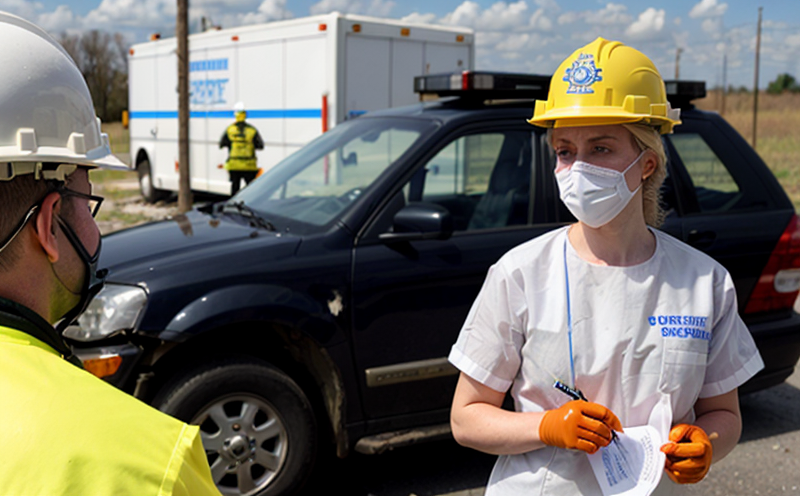ISO 16526 Radiation Effects on Reactor Materials Post-Accident
The ISO 16526 standard provides a framework for assessing radiation effects on reactor materials following an accident. This service is critical in ensuring that the integrity and safety of nuclear reactors are maintained even under extreme conditions. Accidents like those seen at Chernobyl or Fukushima underscore the importance of understanding how irradiation affects materials used in nuclear power plants. The test focuses on evaluating the mechanical, chemical, and physical properties of reactor components exposed to high levels of radiation.
The ISO 16526 procedure simulates an accident scenario where a reactor experiences prolonged exposure to ionizing radiation, typically above 10^4 Gy. This exposure can lead to microstructural changes in materials such as steel or alloys used in the core and pressure vessel. The test aims to quantify these changes through a series of mechanical tests on irradiated samples. By doing so, it helps predict potential degradation and failure modes under accident conditions.
Materials science plays a pivotal role in this testing process. Understanding the interaction between radiation and materials is essential for designing safer nuclear reactors. This service supports the development of robust, long-lasting reactor components that can withstand the harsh environment inside a nuclear power plant. Through rigorous testing, we ensure that any new or existing reactor material used will perform reliably under accident conditions.
The ISO 16526 test protocol is designed to be comprehensive and reproducible. It specifies the irradiation conditions, specimen preparation methods, and post-irradiation mechanical testing procedures. The standard also outlines acceptance criteria for materials deemed suitable for continued use in nuclear reactors. Compliance with this international guideline ensures that reactor components meet global safety standards.
One of the key aspects of ISO 16526 is its ability to provide quantitative data on material degradation due to radiation exposure. This information is invaluable for regulatory bodies, quality managers, and R&D engineers who need to ensure compliance with nuclear safety regulations. By providing precise measurements of changes in mechanical properties like tensile strength or ductility, the test helps in making informed decisions regarding reactor maintenance and replacement schedules.
In addition to its technical significance, ISO 16526 also has broader implications for public safety. Accurate assessment of radiation effects on critical components reduces the risk of catastrophic failures during accidents, thereby protecting workers, nearby populations, and the environment. The service offered here ensures that nuclear operators have access to reliable data needed to maintain safe operating conditions.
The testing process involves several steps: first, irradiated samples are prepared according to specified procedures outlined in ISO 16526. Next, these samples undergo a series of mechanical tests designed to assess their strength and ductility after exposure to high radiation doses. Finally, the results from these tests are compared against baseline data collected before irradiation.
The table below summarizes some common materials tested under this standard along with typical dose levels used in the simulation:
| Material | Irradiation Dose (Gy) |
|---|---|
| Stainless Steel | 10^4 - 10^5 Gy |
| Nickel-Based Alloy | 10^4 - 10^6 Gy |
| Copper Alloy | 10^3 - 10^4 Gy |
The industry applications for this service are vast, ranging from ensuring the safety of nuclear power plants to supporting the development of advanced materials that can withstand extreme conditions. By providing accurate data on radiation effects, ISO 16526 helps maintain high standards in nuclear engineering and contributes significantly to public safety.
Industry Applications
- Regulatory Compliance: Ensures adherence to international standards for nuclear materials.
- R&D Support: Provides data necessary for the development of safer reactor components.
- Safety Assurance: Helps in identifying potential risks associated with irradiated materials.
The service is particularly useful for quality managers, compliance officers, and R&D engineers involved in nuclear power plant operations. By providing accurate and reliable data on radiation effects, it supports decision-making processes related to reactor maintenance and safety protocols. This service also plays a crucial role in ensuring that new materials meet stringent safety requirements before being approved for use.
Eurolab Advantages
At Eurolab, we pride ourselves on offering world-class testing services tailored to the needs of our clients. Our expertise in radiation effects assessment is complemented by state-of-the-art facilities and experienced technical staff who possess deep knowledge of nuclear materials science.
- Advanced Testing Equipment: We utilize cutting-edge equipment capable of simulating extreme irradiation conditions.
- Comprehensive Reporting: Our reports provide detailed insights into the effects of radiation on tested materials, helping clients make informed decisions.
- International Standards Compliance: All our tests adhere strictly to international standards like ISO 16526, ensuring consistency and reliability.
We understand the critical nature of this work and strive to deliver accurate, timely results that meet or exceed client expectations. Our commitment to excellence is reflected in our unwavering attention to detail and adherence to rigorous quality control measures.
Why Choose This Test
The ISO 16526 test is essential for several reasons:
- Avoids Accidents: By understanding how materials behave under extreme conditions, we can prevent potential accidents in nuclear plants.
- Enhances Safety: Ensures that reactor components are safe and reliable even after prolonged exposure to radiation.
- Promotes Innovation: Supports the development of new materials that can withstand harsh environments.
This test is crucial for maintaining public safety and ensuring compliance with international standards. By choosing this service, clients gain access to precise data that informs critical decisions about reactor maintenance and component replacement schedules.





